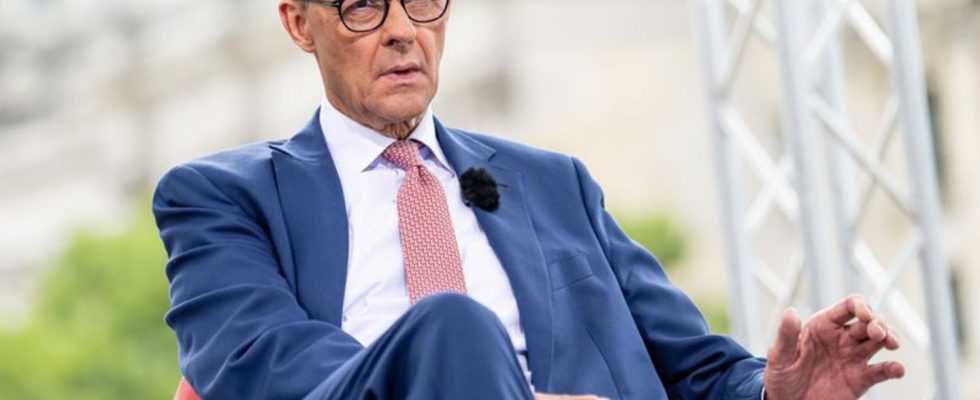parties
Traffic light and Union representatives insist on differentiation from the AfD
CDU party leader Friedrich Merz at the ARD summer interview in the “Report from Berlin”. photo
© Fabian Sommer/dpa
The discussion about the AfD, which is trumping in the polls, continues, and there is even talk of “traitors to the country”. The party itself wants to put pressure on the political competition on one level in particular.
The AfD has been on the upswing in federal surveys for several months and is currently around 20 percent – ahead of the SPD and the Greens and only behind the CDU/CSU.
Green politician Anton Hofreiter told the editorial network Germany (RND): “The AfD is predominantly a group of traitors who act not in the interests of our country but in the interests of opposing powers.” This primarily affects the AfD’s relationship with Russia, but also with China. “You have to be aware of the incredible danger that the AfD poses to democracy and the rule of law, as well as to the prosperity of many people. This has not yet reached all parts of society.” A ban on the right-wing populist party should “under no circumstances be ruled out,” said Hofreiter.
Merz learns AfD ban
Merz, on the other hand, once again rejected an AfD ban in the ARD “summer interview” in Berlin. “Party bans have seldom had any effect in the Federal Republic of Germany. The people who are on the wrong political path are still there. I think very little of that.” The AfD is classified and observed by the Office for the Protection of the Constitution as a suspected right-wing extremist.
After statements that were misunderstood on ZDF five weeks ago at the beginning of the summer break, Merz said on ARD: “We have a clear decision-making position in the CDU. We don’t work with the AfD. Not in the parliaments, not in the local councils”. When asked by the capital city studio manager Tina Hassel whether this also applies to the municipal level, he added: “A no is a no. (…) Also at the municipal level.”
Hesse’s Prime Minister Boris Rhein (CDU) also emphasized that there should be no cooperation at the municipal level. “If there is an important and meaningful project on site, the CDU can submit its own application, and then the municipal parliament agrees to the CDU application. It’s not that difficult,” said the Christian Democrat to the newspapers of the Funke media group. What shocked him the most was the AfD’s “brutally anti-European course.” “This is an attack on the European peace project and the prosperity of our export nation.”
Approaches by Minister of Justice Buschmann
Justice Minister Marco Buschmann (FDP) told the “Welt am Sonntag” when asked how he wanted to counteract the high AfD survey values, there were two drivers for this: migration and concerns about the country’s economic future. The traffic light is more resolute about the issue of migration than the previous grand coalition. Referring to the economic situation, he added: “As serious democrats, I can only recommend a competition for good proposals to solve this problem. We have to put this country on course so that people who go to work every day can be sure that that they will still have a job in two, three, five or ten years.”
AfD federal leader Tino Chrupalla relies on “resistance” from the municipalities against the traffic light government in Berlin. “Look at the inflation, look at the energy prices – what this federal government is doing here has nothing to do with respect,” he said on Saturday at the end of the campaign for the mayoral election in the Brandenburg district town of Seelow. “This must be met with resistance from below, from the people, also at the municipal level.” Pressure must be built up through the parliaments in the municipalities.
The AfD hopes for further successes in the districts, cities and communities. On Wednesday, Germany’s first AfD district administrator, Robert Stuhlmann, was sworn in in Sonneberg in Thuringia. On the same day, the full-time mayor of the AfD in the small town of Raguhn-Jeßnitz in Saxony-Anhalt, Hannes Loth, took his oath of office. A mayor was elected in Seelow in Brandenburg on Sunday. There, the non-party incumbent mayor Robert Nitz and the AfD parliamentary group leader in the city council, Falk Janke, competed against each other. Incumbent Nitz eventually won the election.

